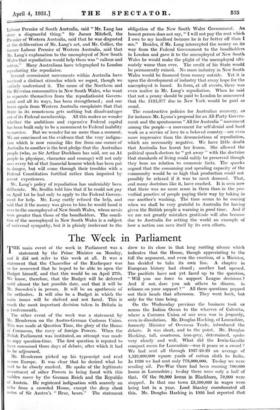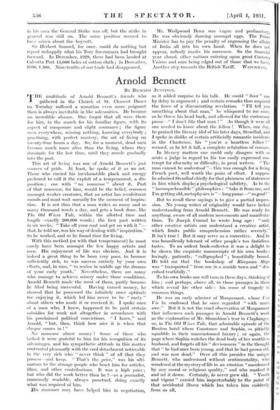The Week in Parliament
THE main event of the week in Parliament was a statement by the Prime Minister on Monday, and it did not refer to this week at all. It was a statement that the Chancellor of the Exchequer was so far recovered that he hoped to be able to open the Budget himself, and that this - would be on April 27th. We know, therefore, that the Budget will be deferred until almost the last possible date, and that it will be Mr. Snowden's in person. It will be an apotheosis of the orthodox. It will also be a Budget in which the main issues will be shelved and not faced. This is much the most important decision taken in Britain in a twelvemonth.
The other event of the week was a statement by Mr. Henderson on the Austro-German Customs Union. This was made at Question Time, the glory of the House of Commons, the envy of foreign Powers. When the Polish Parliament was instituted, an attempt was made to copy question-time. The first question is reputed to have consumed three days of debate, after which it had to be adjourned.
Mr. Henderson picked up his typescript and read across Europe. It was clear that he desired what he said to be closely marked. He spoke of the legitimate resentment of other Powers in being faced with this sudden move by the German Reich and the Republic of Austria. lie registered indignation with scarcely an echo from a crowded House, except the .deep chest notes of Sir Austen's " Hear, hears." The statement drew to its close in that long rustling silence which indicates that the House, though appreciating to the full the argument, and even the emotion, of a Minister, has decided to take its own line. A chapter in European history had closed ; another had opened. The pacifists have not yet faced up to the question, " Will you use force to support League decisions ? And if not, dare you ask others to disarm, in reliance on your support ? " All these questions popped out their heads that afternoon. They went back, but only for the time being.
On the Wednesday previous the business took us across the Indian Ocean to the wharves of Calcutta, where a Customs Union of our own was in jeopardy, even in dissolution. Mr. Douglas Hacking, of Lancashire, formerly Minister of Overseas Trade, introduced the debate. It was short, and to the point. Mr. Douglas Hacking, tall, courteous, iron-grey, determined, spoke very clearly . and well. What did the Irwin-Gandhi compact mean for Lancashire—was it peace or a sword ? We had . sent all through 1927-28-29 an average of 1,523,000,000 square yards of cotton cloth to India. In 1930 we had sent only 778,000,000. To-day we were sending nil. Pre-War there had been running 700,000 looms in Lancashire ; to-day there were only a half of that. Of the. 90,000 looms in Blackburn, 70,000 were stopped. In that one town £3,500,000 in wages were being lost in _a year. Lord Stanley corroborated all this. Mr. Douglas Hacking in 1926 had reported that in his area the General Strike was off, but the strike in general was still on. The same position seemed to have arisen about the boycott.
Sir Herbert Samuel, for once, could do nothing but repeat unhappily what his Tory forerunners had brought forward. In December, 1929, there had been landed at Calcutta Port 15,000 bales of cotton cloth ; in December, 1930, 1;500. Nine-tenths of our trade had disappeared. Mr. Wedgwood Berm was vague and perfunctory. He was obviously dancing amongst eggs. The Prime Minister has to pay the penalty of engrossing the affairs of India all into his own hand. When he does not appear, nobody marks his successor. So the financial year closed, other nations entering upon great Customs Unions and ours being edged out of those that we have. Another step towards the British Tariff. WATernekx,









































 Previous page
Previous page